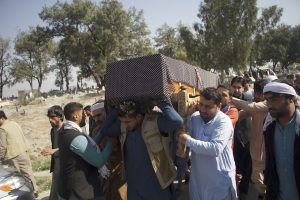The Islamic State group has claimed responsibility for the killing of three women working for a local radio and TV station in eastern Afghanistan, the latest in a spike in targeted killings across the war-tor country. Dozens of people gathered Wednesday for the funerals of the three media workers.
The women were gunned down on Tuesday in separate attacks, according to the news editor of the privately owned station and officials in Nangarhar province.
Afghan officials said police arrested the alleged killer of the three, identifying him as Qari Baser and insisting he was a Taliban — a claim promptly denied by Taliban spokesman Zabihullah Mujahid.
Nangarhar police chief, Gen. Juma Gul Hemat, said Baser had used a pistol with a silencer in the attacks. He was arrested shortly after the attacks by police in Jalalabad, the provincial capital.
The IS claim, posted late Tuesday, contradicted the Afghan government’s accusations against the Taliban. The militants said the three female journalists were targeted because they worked for one of the “media stations loyal to the apostate Afghan government” in Jalalabad.
It was not the first attack against women working at the Enikass Radio and TV. In December, IS claimed the killing of another female employee there, Malala Maiwand.
Afghan President Ashraf Ghani condemned Tuesday’s attack, saying that assaults on “innocent compatriots, especially women, are contrary to the teachings of Islam, Afghan culture and the spirit of peace.”
At the funeral Wednesday of 23-year-old Mursal Wahidi, one of the three victims, her father said he had implored her to quit her job after Maiwand’s killing in December. But his daughter refused, fiercely loving her work.
“Journalism was her life’s dream, she studied and was living her dream,” Wahidullah Khogyani told The Associated Press. He said he did not think that she had received any threats because of her job — but if she did, “she was hiding it.”
Afghanistan is considered one of the most dangerous countries in the world for media workers. Tuesday’s killings brought to 15 the number of media workers killed in Afghanistan in the last six months.
The slayings of the women are part of a larger spike in targeted killings in Afghanistan in the past year, coinciding with the signing of a peace deal between the United States and the Taliban in February 2020. The Taliban have denied involvement in most of the targeted killings. Both the Taliban and the government blame the other for staging the attacks to discredit the peace deal or leverage greater concessions.
The Biden administration is reviewing the deal which calls for the withdrawal of U.S. and NATO troops by May 1. Officials say no decision has been made .
Shokrullah Pasoon of Enikass Radio and TV in Jalalabad — the station the women worked for — said Mursal Wahidi was walking home when armed men gunned her down, according to eyewitnesses. The other two, whom he identified only as Shahnaz and Sadia, were shot and killed in a separate incident, were also walking home from work. Two other people, apparently passersby, were wounded in the shooting attack.
The three women dubbed popular and often emotion-laden dramas from Turkey and India into Afghanistan’s local languages of Dari and Pashtu, added Pasoon, the station’s news editor.
At Sadia’s funeral, her uncle was among hundreds who had gathered to pay their respects. Abdul Ayaz blamed the government for his niece’s death, saying authorities had failed to provide basic security for the nation.
“Before, these killing were happening in the villages, and now they are happening in cities as well,” he said. “I think now we must leave the city and go back to our villages.”
According to its website, Enikass Radio and TV is a privately owned outlet that broadcasts “news, various political, social, Islamic, educational, satirical, and engaging programs and standard dubbing of serials and movies for the people of Afghanistan.”
By Rahim Faiez for the Associated Press in Kabul, Afghanistan.
Associated Press writers Maamoun Youssef in Cairo and Tameem Akhgar in Kabul contributed to this report.
































